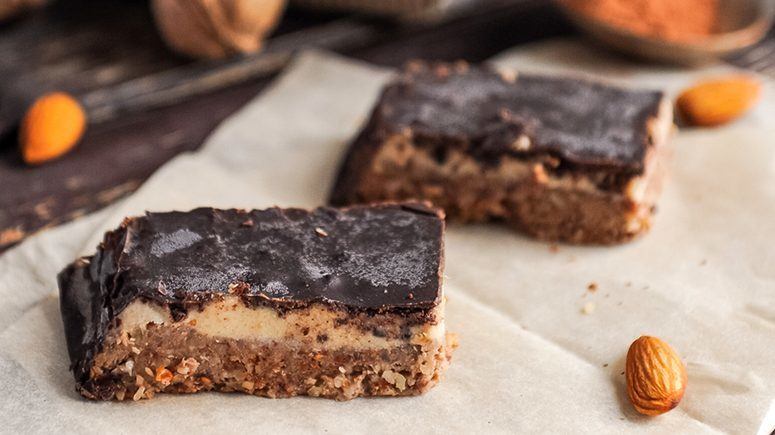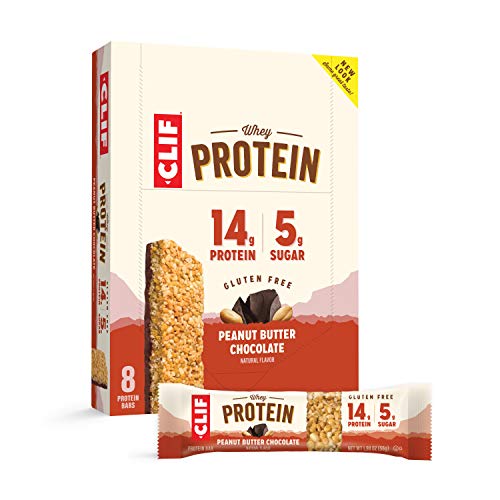Choosing The Healthiest Protein Bars for Weight Loss: FAQs and Product Reviews

Protein bars can be a great addition to a healthy diet. They are an easy snack or meal replacement. But if you want to lose weight, make sure you select the right protein bars for your goals. In this post, we will discuss the healthiest protein bars for weight loss.
Healthy protein bars contain the right balance of the macronutrients: protein, carbohydrates, and fat. They are generally made from real ingredients and don’t contain highly processed artificial sweeteners.
Just remember, every person has their own dietary and lifestyle goals. The right bar for you might not be the right bar for everyone. It is important to understand your dietary needs before selecting the perfect protein bar. Are you trying to lose weight or bulk up? Are you an athlete? Always on the go?
By considering these questions and reviewing this article, we hope you feel prepared to select the right protein bar for your needs.
Why Do People Use Meal Replacement Bars?
People use meal replacement bars for many reasons. This type of snack is always a quick option that needs no preparation and can be carried around very easily. Naturally, meal replacement bars aren’t supposed to replace a balanced diet; however, they can help you reach your daily required nutrient intake in a healthy, convenient way. (1)
What Are Some Important Terms to Know?
Before you can pick the best healthy protein bars, you should understand the key terms you might see on protein bar labels.
 Natural
Natural
The Food and Drug Administration (FDA) does not have a set definition of “natural” foods. So, this term means different things on different products. But generally, this refers to foods that are not artificial or highly processed.
 Organic
Organic
To be Certified Organic by the United States Department of Agriculture (USDA), a product must “have an ingredients list and the contents should be 95% or more certified organic, meaning free of synthetic additives like pesticides, chemical fertilizers, and dyes, and must not be processed using industrial solvents, irradiation, or genetic engineering. (2)”
 Nutrient-Balanced
Nutrient-Balanced
This typically refers to a product’s macronutrient ratios. Macronutrients are protein, carbohydrates, and fat. It might also refer to the product’s ingredients. A product that is nutrient-balanced would mostly be made from whole, healthy ingredients instead of artificial, processed ingredients (3).
 Sugar-Free
Sugar-Free
This simply means a product doesn’t contain any natural sugars. But this doesn’t mean it is healthy. It could contain artificial sweeteners, which your body processes the same way as natural sugars.
 Gluten-Free
Gluten-Free
This means a product does not contain the protein gluten. Gluten is not inherently unhealthy. Only individuals with Celiac Disease or a gluten allergy need to avoid this protein. So, gluten-free does not automatically equal healthy (4).
 Dairy or Lactose-Free
Dairy or Lactose-Free
These are not always the same. Dairy-free products are made from nuts or plants. They are typically for individuals following a vegan or plant based diet. Lactose-free products do not contain the milk sugar lactose. But they can still be dairy-based. They are generally made for individuals who are lactose-intolerant and do not have the lactase enzyme necessary to digest lactose.
Wanted and Unwanted Protein Bar Ingredients
As you decide on the best healthy protein bars, you need to know what ingredients to look for (and which to avoid).
The healthiest bars contain protein from real food sources, like nuts, seeds, meat, or brown rice. These bars are packed with fiber. Also, any sweeteners should be from natural sources, like fruit.
Unhealthy bars generally contain ingredients like high fructose corn syrup, maltodextrin, sugar alcohols, soy protein isolate and fractionated palm kernel oil. These bars typically contain a large number of carbohydrates compared to their protein and fiber contents (5).
How Do Protein Bars Help People Achieve Dietary Goals and Lifestyles?
The best weight loss bars don’t contain scary artificial chemicals that promise immediate results. Instead, individuals who want to lose weight should choose protein bars made from natural ingredients. Use the nutrition panel to track your calorie goals and macronutrient needs. If the bar fits into your dietary plan, it can be used to help you naturally lose weight. Also, the right protein bar will keep you full for longer, so you won’t be tempted to consume extra calories.
Protein bars can also fit into an active lifestyle. Healthy bars can be a nutritious on-the-go meal or snack for active individuals. Also, if you are trying to maintain a certain daily macronutrient consumption, use the nutrition panel to choose a bar that fits your goals.
There are also protein bars specifically made for children. If you choose a healthy bar for your child, they can enjoy a delicious snack packed with protein and nutrients. The right protein bar can be a great lunchbox addition or afterschool snack for picky or busy kids. Teenagers usually require an extra amount of protein due to their fast growing pace and protein bars can be a satisfying way of reaching their nutritional needs.
How Protein Bars Boost Weight Loss Mechanisms
As we discussed earlier, the best bars for weight loss won’t promise immediate results. In fact, healthy protein bars shouldn’t mention weight loss at all. Instead, individuals on a calorie restricted diet can use healthy protein bars to achieve their calorie goals.
And although protein bars shouldn’t advertise weight loss, they can still help boost weight loss mechanisms naturally. The right protein bar should have enough protein and fiber to keep you full for a few hours. Protein triggers your body to reduce ghrelin (the hunger hormone) levels. It also promotes the production of GLP-1, peptide YY and cholecystokinin (hormones that work to suppress your appetite). And if you feel full, you are less likely to consume excess calories. (6)
But even though protein bars can fit into a healthy lifestyle, you shouldn’t only rely on protein bars to achieve your weight loss goals. Ultimately, weight loss boils down to the difference between calories in versus calories out. So, you should make sure the occasional protein bar fits into your overall dietary goals.
What Nutritional Data Should You Focus On to Balance Macros?
The macronutrients are protein, carbohydrates, and fats. And your body needs macronutrients to survive.
According to the Dietary Guidelines for Americans, adults should consume the following (7):
- 45% to 65% of calories from carbs
- 10% to 35% percent of calories from protein
- 20% to 35% percent of calories from fat
Depending on your current goals and physical condition, though, this ratio is often adjusted. For example, low-carb, high-fat diets could work best for people trying to lose weight or those suffering from diabetes. As studies proved, this happens because fat enhances the feeling of satiety, which prevents people from giving in to their cravings and instead sticking to a healthy diet. (8, 9)
However, protein is equally important. Known as the key element to building and repairing muscle, our body uses the amino acids of this macronutrient to support and strengthen muscle tissue. If your workout implies much physical effort or you’re a professional athlete, your protein intake should be higher than the usual recommendations. In other words, protein helps your body lose fat while preserving lean muscle mass. (10)
How Can Somebody Balance Macros for Weight Loss?
In order to balance your macros, you need to understand your calorie needs. You should speak with your doctor or registered dietitian to determine the appropriate amount of calories you should consume for weight loss. Once you have this number, you can calculate how the percentage of macros for your needs.
So, if you were following a 1500 calorie diet, your daily macros should be as following:
- 675-975 calories from carbs
- 150-525 calories from protein
- 300-525 calories from fat
Tracking macronutrient consumption isn’t such an easy task; that’s why you can use apps like MyFitness Pal or the Carb Manager on a daily basis.
How Can You Easily Find The Best Protein Bars?
Yes, finding the perfect protein bar takes work. But later in this article, we discuss some of our favorite options.
When looking for the best protein bar, check how much protein it contains. You want to aim for a bar that has at least 10g of protein. Check the amount and type of sugar used. You should try to avoid artificial and unnatural sources. Look for a high fiber content and make sure the bar only contains healthy fats.
- High Fructose Corn Syrup
- Sugar Alcohols
- Soy Protein Isolate
- Brown Rice Syrup
- Soy Lecithin
- Sucralose
- Fractionated Palm Kernel Oil
Are There Any Ingredient Ratios That Make The Perfect Bar?
Remember, protein bars are not one-size fits all. The perfect goal for you needs to fit into your dietary goals and lifestyle. This will vary if you are trying to lose weight or build muscle.
Generally, avoid bars packed with empty calories and added sugars. The bar should contain at least 10g of protein. Also, look for bars that have less than double the amount of carbohydrates to protein (11).
Overall, it is important to study the nutrition label before buying a protein bar. Know your dietary goals and only pick bars that help you achieve these goals. Avoid artificial ingredients, added sugars, and low protein bars. Let’s look at some of the best healthy protein bars.
What is The Best Protein Bar for Weight Loss?
We looked at a variety of options and picked 5 of the healthiest protein bars for weight loss. We considered macronutrient ratios, ingredients and quality before making our selections. Read on for our reviews of these bars.
These bars are made with non-GMO organic ingredients, like almond butter, peanuts, and rolled oats. With only 5g of sugar and no sugar alcohols, this is a good option for anyone following a low-sugar diet. The crunchy bar is available in many different flavors, including Peanut Butter & Chocolate and Vanilla Almond. It contains 14g of protein, 13g of fat, and 24 g of carbohydrates.
- Very filling because it contains 14g of protein
- Made with organic ingredients
- Free from soy, sugar alcohols or brown rice syrup
- May cause gas in some individuals
At 20 grams of protein per serving, this bar is a great option that fits most weight loss diet requirements. Its compact shape and texture provide an easy way to consume healthy protein, without sacrificing your dietary goals. As a plus, the shape and texture of this product turn it into a delicious snack that satisfies both your nutritional needs and your taste buds!
- Only 2 grams of sugar per serving
- Perfect for gluten-free diets
- Available in multiple delicious flavors
- Some customers say the flavors are too sweet for their taste
This bar is made with organic superfoods. At 100 calories and 5g of protein, it is ideal for those with an active lifestyle who are currently on a weight loss training program. If you are following a low calorie diet, this could easily be incorporated as a snack in your dietary plan. It is gluten-free and non-GMO. However, some customers were not happy with the price point of these small bars. Also, this bar should be refrigerated to maintain freshness.
- Gluten-free, soy-free, non-GMO Project verified and USDA Certified Organic
- Made from real ingredients such as peanut butter
- Sweetened with honey and free from sugar alcohols
- The protein content (5g) may not be enough for active people
This is not your traditional jerky. This delicious protein bar is made from cranberries, apples, oranges and antibiotic-free buffalo. It is gluten-free and perfect for someone following a paleo diet. Since it contains 7g protein, only 6g sugar, and real ingredients, it is a great snack that also satisfies those who like sweeter flavors. Use this bar as a nutritious snack to help maintain your dietary goals.
- Small ingredient list including real foods, like buffalo meat and fruit
- Gluten-free, Nitrate-free, with no antibiotics or added hormones
- Nutritious snack at only 70 calories
- Some customers thought the aftertaste was bland
This delicious protein bar is gluten-free and non-GMO. It is packed with 16g of protein and 22g of carbohydrates. Perhaps its greatest benefit is that it doesn’t include many added sweeteners and it can easily fit into a weight loss diet. The main protein source is grass-fed whey originated from New Zealand cows that were not exposed to any antibiotics or pesticides.
- Delicious and filling bar that contains 16g protein
- Made from real ingredients like pumpkin seeds and almond butter
- Gluten-free, soy-free and non-GMO
- Some customers complained that the bars are too sweet
Our Choice
All the bars we reviewed could fit into a healthy lifestyle. They were generally high in protein and free from harmful ingredients that may get in the way of your weight loss process. Most were made from real organic ingredients and their protein content is originated from high-quality sources. Also, the bars fit a variety of budgets and dietary habits.
However, after reviewing the healthiest protein bars for weight loss, we selected the Atlas Bar as our favorite.
This bar is loaded with 16g of natural protein (well above the 10g we recommend) from grass-fed whey. It contains 12g of fat and 22g of healthy carbohydrates. Also, it complies with the suggestion to pick bars that have less than double the amount of carbohydrates to protein. The snack is also free from gluten or soy, so it fits into most diet recommendations.





